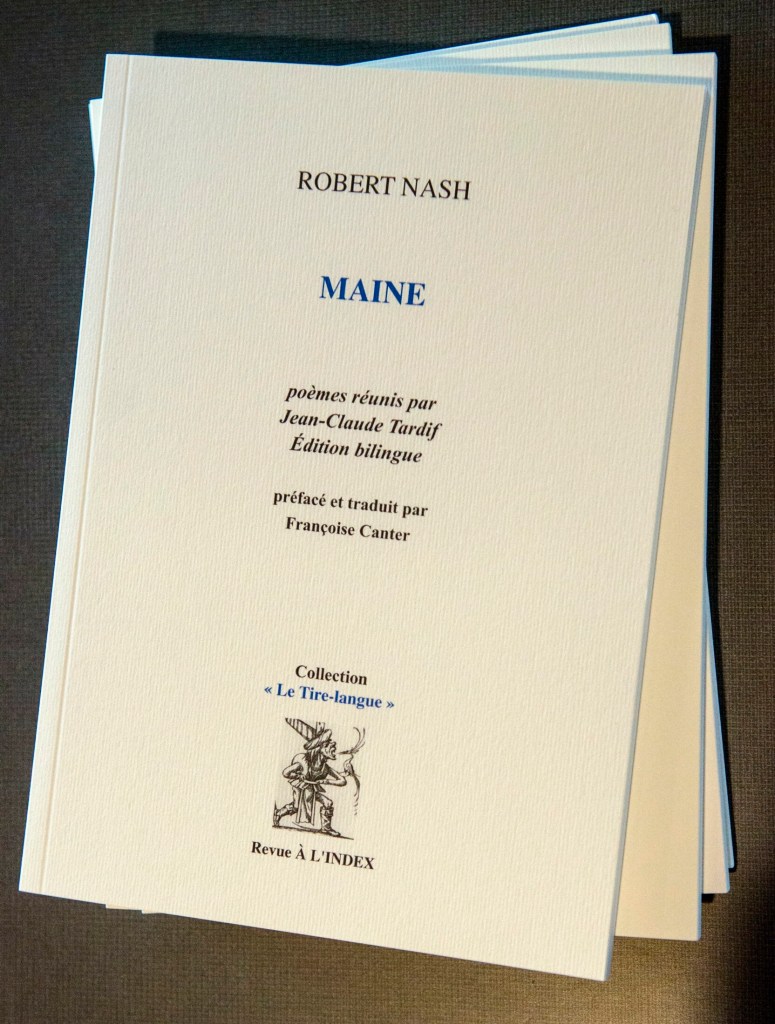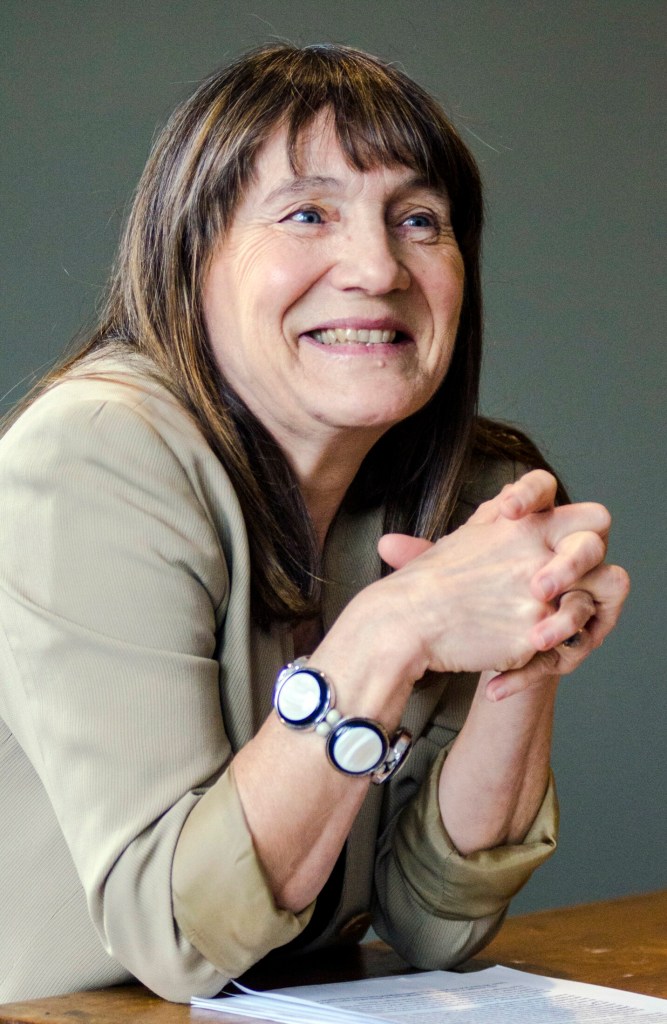AUGUSTA — Seattle author Françoise Canter came to Maine to give the state — to give Augusta — its poet back, she told an audience gathered Saturday at Lithgow Public Library to hear her give readings of “Maine.”
That poet, the mysterious Robert Nash, lived in or just outside Augusta in the 1980s, moving to a shack in Maine after first his son and later his wife — who had always wanted to move to the state — died. He lived as a self-described half trapper, half hobo, before, Canter said, he disappeared into the woods on May 31, 1995, never to be seen again.
Nearly all that the France-born Canter knows of Nash was revealed by reading a collection of the poetic letters he’d written to an old friend in France. The friend’s son, Jean-Claude Tardiff, was cleaning the basement of the family’s home in 2016 in France when he came across a suitcase filled with Nash’s poems written to his friend, many of them so brittle and damaged by humidity they were barely readable. He contacted Canter, who has written her own bilingual poems, to translate and recompose the poems, which were all written in French. Once she started reading Nash’s words, she was struck by his stunning musings on the Maine woods and coast, life, death, and the natural world. She thus embarked on a project to recompose the poems, publishing them in both French and English, with her friend Sarah Porter, a teacher, reviewing and fine-tuning the English translations. The collection of the poems found in the suitcase thus became a book, titled simply “Maine.” She said they’ve since found other letters in the same basement, which they’re putting into another book.
Canter said the work was so intense, and Nash’s writing was so compelling, they feel as though Nash is their friend.
Canter, who with Porter discussed their work and Nash’s life and poetry with about a dozen people Saturday at Lithgow, said she made a promise about a year ago that she would go to Maine to see what Nash described so intimately in his poems, and, as she wrote in the book’s preface, “to find something of my friend.”
“I promised to give your city, your state, your poet back. That’s why I’m here today,” Canter said Saturday. “Following in Robert Nash’s footsteps is a very moving experience.”
Nash came to Maine after first his son, Lee, died in 1974 in the Vietnam War and, two years later, his wife Catriona died, Canter said, from both illness and her broken heart from the death of their son. Canter isn’t sure, but she believes the family likely lived in Maryland or Pennsylvania previously.
The letters to his French friend, whom he met during World War II, became more and more poetic, Canter said. She said even though he spent much of his life elsewhere, Maine is where he became a poet.

Françoise Canter, left, and Sarah Porter put on an event Saturday about Augusta poet Robert Nash at Lithgow Public Library in Augusta. Kennebec Journal photo by Joe Phelan
His poems in the book “Maine” intimately describe his life in the woods while making trips to visit the coast, including time spent catching lobsters, and his interaction with his natural surroundings. They also contemplate life and death, with some text referring to his late son and wife.
In one poem Canter read Saturday in French, and Porter read in English, Nash wrote:
“Sometimes I see Lee’s face
I hear his voice and Catriona’s singing her little songs
I try to sing along with them
but nothing comes.
Nothing from my mouth but silence
my lips are dry
my eyes wet from the effort
to remember.
Yesterday, in Augusta,
I tried to talk with Ed, the doctor.
He told me that he sees nothing wrong
with age
swallowing becomes harder.”
The book “Maine,” Porter said, doesn’t have an American publisher and isn’t available online. They sold several copies they had brought with them Saturday, and the book is among Lithgow’s collection.
Julie Olson, assistant director and adult services librarian at Lithgow, said reading the book was especially interesting because of the many local places and connections found in the poems.

Françoise Canter, front left, and Sarah Porter, rear left, put on an event Saturday about Augusta poet Robert Nash at Lithgow Public Library in Augusta. Kennebec Journal photo by Joe Phelan
Canter said she’s not a detective, and she didn’t see her role as being responsible for finding out more about Nash’s life in and around Augusta, though she and Porter did visit a few key spots during their visit, including Aubuchon Hardware, the former Hussey Hardware on Bangor Street, theorizing that could have been the hardware store Nash mentions in some of his poems, where he got building supplies to fix up his shack in the woods. Canter said no one with whom they spoke at the store remembered Nash.
Canter seemed somewhat hesitant to learn about Nash other than what she has learned from reading his work. She said she learned of his disappearance into the woods from a notation written alongside the last poem of the book, written May 25, 1995, which said it was the last poem written before Nash disappeared May 31, 1995. She said she doesn’t know who wrote the notation, how Nash’s last poems got to France after his death, or what, exactly, happened to Nash. She said she believes he took to the woods because he sensed his death coming.
The poem believed to be his last:
“Death waits for me,
I observe her and she watches me
The sole difference between us
The intensity in the look
Keith Edwards — 621-5647
Copy the Story Link
Send questions/comments to the editors.






Success. Please wait for the page to reload. If the page does not reload within 5 seconds, please refresh the page.
Enter your email and password to access comments.
Hi, to comment on stories you must . This profile is in addition to your subscription and website login.
Already have a commenting profile? .
Invalid username/password.
Please check your email to confirm and complete your registration.
Only subscribers are eligible to post comments. Please subscribe or login first for digital access. Here’s why.
Use the form below to reset your password. When you've submitted your account email, we will send an email with a reset code.